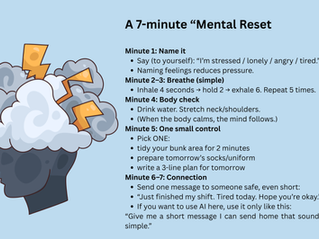Are You Ignoring This Silent Threat at Sea?
- stavrikleanthous
- May 19, 2025
- 3 min read
Updated: May 22, 2025

Every May 17th, the world observes World Hypertension Day, a global reminder of the silent threat posed by high blood pressure.
Life at Sea: A Perfect Storm for Hypertension?
Working in such a dynamic and demanding environment, you face challenges that can impact health if not properly addressed – irregular sleep, high-stress and occasional reliance on high-sodium foods due to their convenience. While these factors can contribute to a higher risk of hypertension, often called the “silent killer”, they do not define your journey. With practical strategies and a proactive approach, you can navigate these challenges and take meaningful steps toward better heart health.
According to a 27-year review published in 2023, there is a high prevalence of high blood pressure amongst seafarers (45.2%). Left unmanaged, it can lead to heart disease, stroke, kidney failure, and other life-threatening complications.
But here is the good news: hypertension is preventable and manageable, even while onboard.
Here are some tips to help you protect your heart and take charge of your health:
Watch your salt!
Canned, smoked, and preserved foods are often packed with salt, which raises blood pressure. Choose homemade versions as much as possible, limit salty foods such as instant noodles, salted nuts and fish, sauces, cured meat, cans and ready-made meals.
Pro tip: Rinse canned foods (such as beans or vegetables) under water to reduce excess sodium.
Increase your potassium intake!
Potassium helps balance out sodium in your body and keeps blood pressure in check. Bananas, dried fruits, canned beans, and potatoes (with skins) are great sources.
Stay hydrated!
Dehydration can increase stress on the heart. Avoid relying heavily on sugary drinks or caffeine. Aim for at least 8-10 glasses of water per day, and more if you are working in hot or humid conditions.
Control your portion sizes!
Try to eat slowly, be mindful of your fullness cues, and avoid second servings of high-calorie, high-sodium dishes. Try to stick to the Harvard Healthy Eating Plate to get all the essential nutrients of a meal.

Mind the stress!
Chronic stress can significantly impact blood pressure over time. Incorporate simple relaxation techniques such as deep breathing, listening to calming music, or writing in a journal. Even a few minutes of mindful activity each day can help support your mental wellbeing.
Stay physically active!
Regular movement is essential for maintaining heart health. A basic routine using bodyweight exercises such as push ups, squats, or resistance band workouts can help improve circulation and reduce hypertension risk. Consistency is more important than intensity.
Prioritize quality sleep!
Lack of restful sleep can raise both stress levels and blood pressure. Whenever possible, create a sleep-friendly environment by minimizing light and noise, and sticking to a consistent rest schedule. Prioritizing sleep is very important.
Know Your Numbers
One of the most empowering steps you can take is to monitor blood pressure regularly. A reading of 90/160-120/80 mmHg is normal, while higher may indicate hypertension and should be addressed, even while onboard. For the most accurate results, measure your blood pressure in the morning and evening, while you are calm and rested.
If you take medication for blood pressure, do not skip doses and set reminders if needed.
Final Thought: Be the Captain of Your Health
This World Hypertension Day, let’s not just mark the date, let’s mark a new beginning. As a seafarer, you ensure the smooth sailing of the global economy. You deserve the same dedication to your own health.
Small changes in your diet and lifestyle can make a world of difference!
Quick Self-Check: Are you at risk?
Do you regularly eat salty or processed foods?
Do you sleep less than 6 hours at night?
Do you experience frequent stress onboard?
Do you rarely exercise during voyages?
If you answered yes to two or more, it might be time for a blood pressure check!
This article has been authored by Oceanic Health & Wellbeing Department, a team of nutrition and dietetics experts, as part of our commitment to enhancing crew wellbeing in the maritime industry.





































































































I was diagnosed with Parkinson’s disease four years ago. For over two years, I relied on Levodopa and several other medications, but unfortunately, the symptoms kept getting worse. The tremors became more noticeable, and my balance and mobility started to decline quickly. Last year, out of desperation and hope, I decided to try a herbal treatment program from NaturePath Herbal Clinic.Honestly, I was skeptical at first, but within a few months of starting the treatment, I began to notice real changes. My movements became smoother, the tremors subsided, and I felt steadier on my feet. Incredibly, I also regained much of my energy and confidence. It’s been a life-changing experience I feel more like myself again, better than I’ve felt…